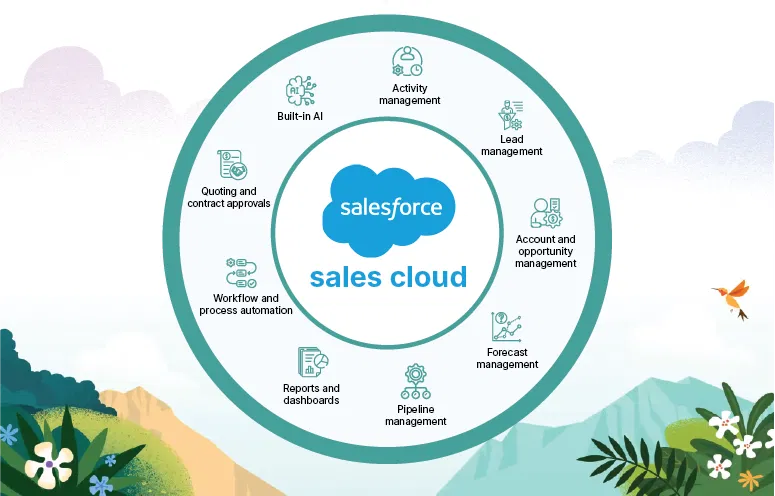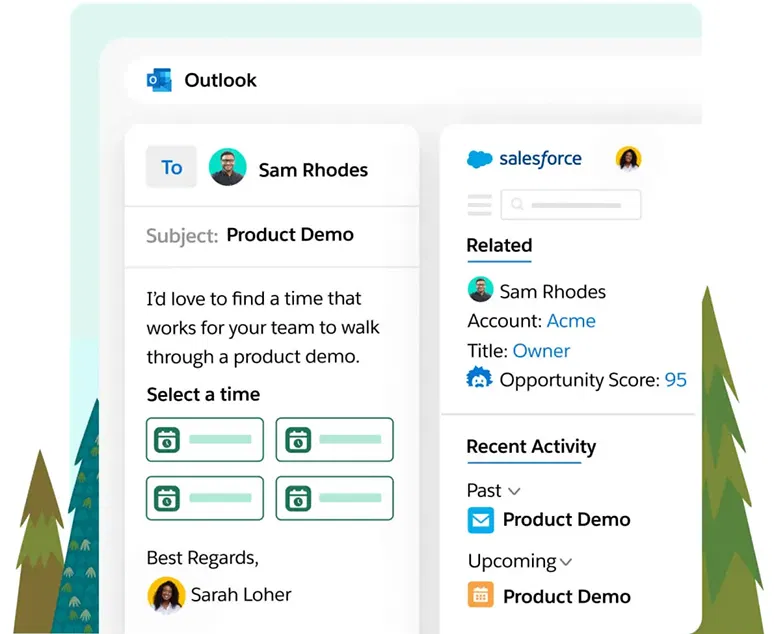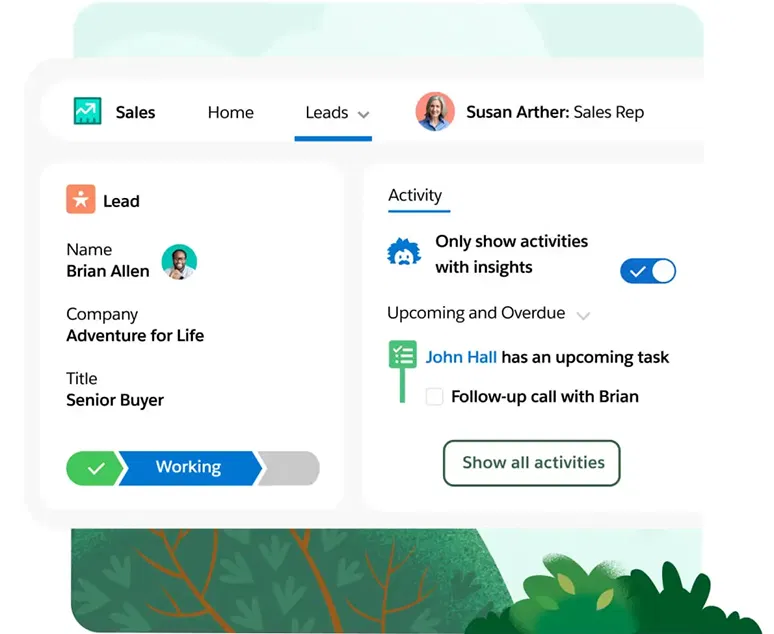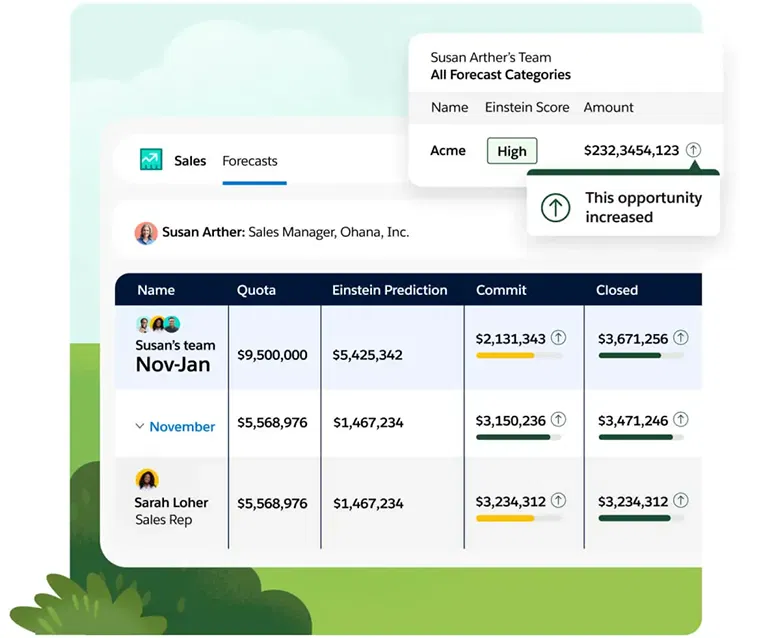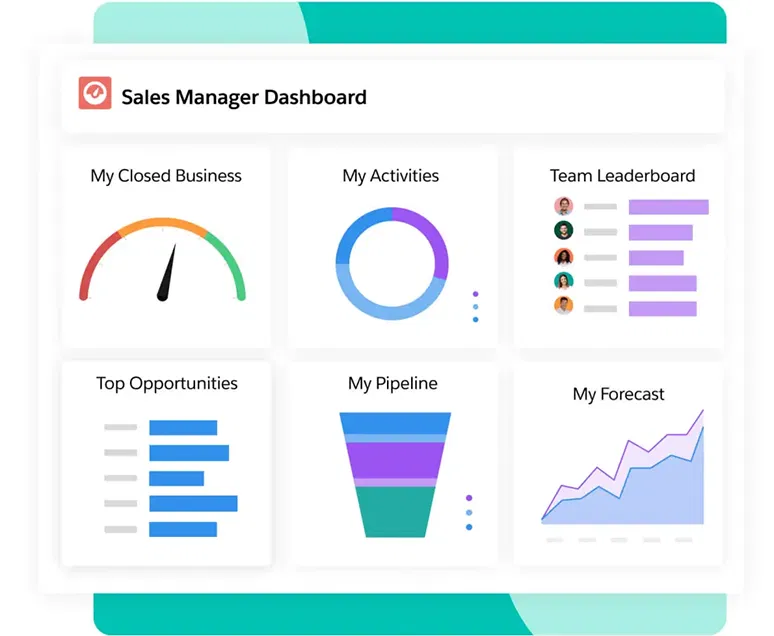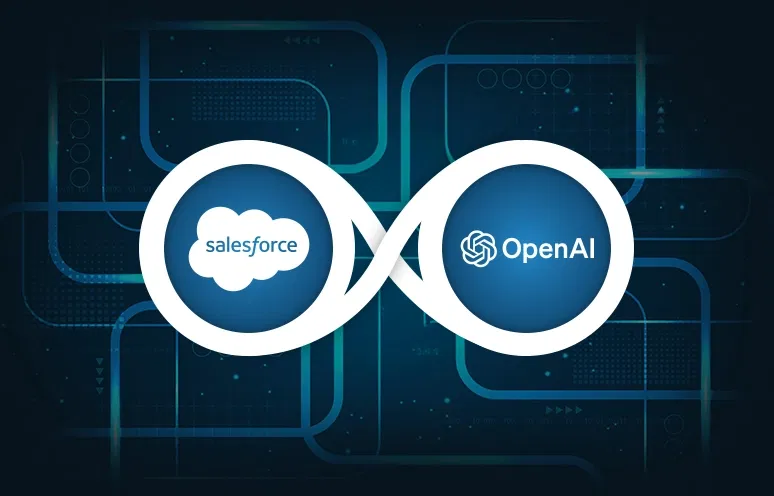Salesforce Sales Cloud helps organizations build a foundation for revenue growth. It automates entire sales processes from lead generation and qualification to deal closure and post-sales follow-up.
Among its many capabilities, it is known for guided selling with AI-powered deal insights, which helps sales teams close deals faster.
In this blog post, we will share the top nine Salesforce Sales Cloud features that organizations like yours should be using to drive productivity, increase revenue, and create lifelong customer relationships. Let’s learn.
What is Salesforce Sales Cloud?
Salesforce Sales Cloud is a cloud-based Customer Relationship Management (CRM) platform. It centralizes customer data, automates sales workflows, and provides tools to track customer interactions, forecast revenue, and most importantly, manage customer relationships for B2B and B2C.
What are the key Salesforce Sales Cloud features?
There are nine key features with 100+ functions on the Sales Cloud platform. And they are designed to automate sales processes so that organizations like yours can grow their accounts, find new customers, and close deals faster.
1. Activity management
Activity management centralizes customer-related interactions including emails, calls, events, and meetings in one unified timeline. It helps sales representatives maintain consistent communication and follow up effectively with their leads and clients.
Sales teams can streamline daily operations and keep the entire team aligned. And organizations can manage activity data associated with leads, contacts, accounts, and opportunities.
Image Source: Salesforce
Key functions of activity management:
- Automated activity capture
- Consolidated engagement view
- Email integration (e.g. Outlook, Gmail)
- Task assignment and reminders
- Shared calendars and event tracking
2. Lead management
Lead management helps sales reps automate tasks and score leads based on engagement so that they can focus on the most promising prospects. It uses AI to prioritize the best leads (ones with high potential) based on customer profiles that generate revenue. Organizations can make sure that no potential customer is overlooked, and that outreach is timely and relevant. Overall, it increases rep efficiency with actionable and prioritized to-do lists.
Image Source: Salesforce
Key functions of lead management:
- Lead capture and assignment rules
- Lead scoring and grading
- Lead nurturing workflows
- Conversion tracking
3. Account and opportunity management
Account and opportunity management gives a 360-degree view of customers and prospects. It provides activity history, key contacts, communications, and internal discussions.
Using such insights, sales teams can understand customer needs, preferences, and history. And organizations can ensure that they can identify the key decision-makers and build strong customer relationships.
Key functions of account and opportunity management:
- Account hierarchy tracking
- Contact role definition
- Relationship mapping
- Customer profiles and notes
4. Forecast management
Forecast management provides real-time visibility into the entire sales pipeline as well as future revenue. It can identify trends and at-risk deals, which ultimately helps in predicting revenue accurately. For such a process, it uses AI capabilities to analyze current trends, historical data, and real-time deal updates.
With forecasting insights, sales reps can find upsell opportunities to build more proactive sales strategies. And organizations can track performance metrics across reps, regions, and products using customizable dashboards.
Image Source: Salesforce
Key functions of forecast management:
- Real-time updates
- Customizable metrics
- Tools to collaborate
- Tools to measure performance
- AI-driven insights
5. Pipeline management
Pipeline management helps sales teams visualize and track deals at every stage of the sales cycle. It analyzes deal stage, value, and activity levels. And hence, sales teams can get real-time visibility into opportunities that are progressing and deals that are stalling. Ultimately, sales teams can focus on the right deals at the right time.
Key functions of pipeline management:
- Real-time updates on deal status
- Opportunity filters by amount, close date, product, etc.
- Alerts and insights for high-risk deals
- Integration with tasks and notes
6. Reports and dashboards
Reports and dashboards offer analytics and visualization tools. They track team’s performance and identify market trends and risks. These insights help sales teams understand which parts of their strategies are successful and which parts need improvement.
Sales managers can track KPIs, monitor sales performance, and identify key areas for improvement for each rep. And businesses can get detailed understanding of pipeline health, team productivity, and campaign effectiveness.
Image Source: Salesforce
Key functions of reports and dashboards:
- Custom report builder
- Real-time dashboards
- Scheduled report delivery
- Drill-down capabilities
7. Workflow and process automation
Workflow and process automation automates repetitive and time-taking manual tasks. It takes meeting notes, auto-assigns leads, creates tasks, and sends follow-up reminders, all without manual input. Organizations can make sure that the sales processes flow smoothly from one step to the next.
Key functions of workflow and process automation:
- Automated task creation and routing
- Approval workflows
- Custom rule-based processes
- Email and notification triggers
8. Quoting and contract approvals
Quoting and contract approvals help sales teams to generate, manage, and send quotes faster. It provides built-in pricing rules, product configurations, and templates. Also, it helps get approvals quickly. To automate the review process, it can automatically route them to the right people based on deal value, discount thresholds, and contract terms.
Key functions of quoting and contract approvals:
- Guided quote generation
- Product and Pricing Configuration (CPQ)
- Approval routing by rules
- E-signature and integration with contract tools
9. Built-in AI
Salesforce Einstein is a built-in AI layer in Sales Cloud. It provides predictive insights and intelligent recommendations to guide sales reps. To generate such insights, it analyzes historical data, activity patterns, and deal trends so that sales teams can find high-priority leads and next-best actions.
Key functions of built-in AI:
- Predictive lead and opportunity scoring
- Deal health insights
- Smart follow-up suggestions
- Forecast accuracy improvements
What are the Salesforce Sales Cloud benefits?
Salesforce Sales Cloud provides one platform to manage leads, customers, and sales activities. It benefits all parties involved, sales teams, other customer-facing teams such as support, organization, and most importantly, customers.
Stronger customer relationship
Sales Cloud offers a 360-degree view of each customer. It provides communication history, preferences, activity logs, and past purchases. Using such insights, sales teams can deliver personalized and timely experiences to their customers. And ultimately, strengthen their trust and loyalty.
Increased sales productivity
The platform automates repetitive tasks such as data entry and follow-up reminders and provides AI-driven insights (via Salesforce Einstein). It enables sales teams to spend more time selling and less time on admin. And over the period, the process increases efficiency and helps sales teams close deals faster.
For example, sales teams can instantly identify which prospects are most likely to convert.
Better team collaboration
Sales Cloud integrates with tools like Slack. It works as a central platform and establishes a seamless channel for sharing information across teams, from sales to marketing to customer support. It helps all teams stay aligned on customer status and collaborate more effectively.
Book a guided tour of Sales Cloud with our Salesforce certified consultant
How to implement Salesforce Sales Cloud in your organization
Salesforce Sales Cloud implementation requires alignment with your sales processes, integration of existing systems, and team training. You can collaborate with an experienced certified Salesforce partner to easily implement Sales Cloud.
- Define your sales process and goals
- Choose the right Salesforce edition
- Partner with a certified Salesforce consultant
- Customize the platform to fit your workflows
- Migrate accurate and clean data
- Train your sales and support teams
Collaborate with Softweb Solutions
We are a certified Salesforce consulting partner equipped to help you implement Salesforce Sales Cloud smoothly and efficiently. Our team of 25+ certified Salesforce consultants focuses on helping clients make the most of the Salesforce platform. And we can help you, too.
Connect with our certified cloud consultant to see how we can help you align the platform with your sales goals and maximize ROI.
FAQs
1. What are the main features of Salesforce Sales Cloud?
Sales Cloud offers lead and opportunity management, contact and account tracking, workflow automation, email integration, AI-powered insights (via Salesforce Einstein), mobile access, and customizable dashboards and reports.
2. How does Sales Cloud help improve sales team’s productivity?
It automates routine tasks, provides real-time insights, prioritizes high-value leads, and gives reps access to key data anytime, anywhere, helping them focus more on selling and less on admin work.
3. Can Sales Cloud integrate with your existing tools and CRMs?
Yes, Sales Cloud supports integration with popular tools like Outlook, Gmail, Slack, marketing platforms, and many CRMs through built-in connectors, APIs, and AppExchange apps.
4. What analytics or forecasting tools are available in Sales Cloud?
Sales Cloud includes customizable reports, dashboards, and AI-driven forecasting tools that help teams track performance, predict revenue, and make informed decisions.
5. How secure is Salesforce Sales Cloud for managing customer data?
Salesforce follows industry-leading security practices, offering data encryption, multi-factor authentication, role-based access, and regular compliance audits to keep customer data safe.
